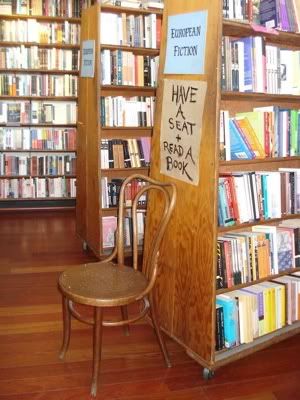
Bookstores can scare away a lot of people, because buying a book is kind of a big commitment. Most paperbacks cost around $15.00, which can easily mean a week’s worth of lunch for a lot of young adults. And don’t even mention hard covers — you may as well start negotiating a loan.
And books aren’t like albums or movies or really any other purchase you can make, because there’s always a chance you won’t even experience the book. Even with the worst of albums or movies, you can usually get through them at least once. But due to time and frustration and boredom, books can go permanently unfinished, which meant you will have devoted some money and time on a journey you never got to finish.
On top of that, the thought of someday having people over, them seeing a book on your shelf and exclaiming “I love this!” and having to sheepishly admit that you haven’t really read it is cringe-worthy enough to drive some people permanently away from the purchase counter.
But this really shouldn’t be the case, because owning books is awesome. They’re like a map of yourself; your different interests and sensibilities, the phases you went through, the people you tried to impress. Even the half-read books are great to have, because sitting right next to the books you’ve reread a few times, they serve as a contrast between how you see yourself and who you really are. Studying a bookshelf is a great way to address and come to terms with your true self, whatever that means.
Also, owning books means you get to lend them. If you’re lucky, you’ll someday have the experience of trading books with an acquaintance, and by the time you’re both finished and have traded back, you’ll have become friends. It’s almost impossible to read someone else’s dog-eared paperback copy of their favorite book and not fall a little bit in love with them, at least in a platonic way.
But even if you know all this, it can still be difficult to whip out a wallet to buy a book that you’re not getting paid or graded for reading. That’s totally understandable, so here’s a mental checklist to go through to ensure you won’t regret the purchase:
1. Even if it has a beautiful cover or an intelligent-sounding title, it should be something you’re more excited to read than to casually leave on your coffee table for people to see.
2. If it’s by an author you’ve never read before, make it on the short side. So yeah, the 1000+ page Infinite Jest looks cool, but maybe try reading something else by David Foster Wallace first so you can be sure you like his writing style.
3. Recommendations from friends are great, but your own intuition is better. Some books just feel better than others, and that’s not an instinct to be scoffed at or ignored.
4. Is it a recent bestseller or well-known classic? If so, put it down, text your friends, and ask if you can borrow it. I promise, someone has it.
Now you’ve bought a book, and hopefully one that you can be excited about. Go to the café next store, sip on some tea, start reading, and revel in your own quaintness.

No comments:
Post a Comment